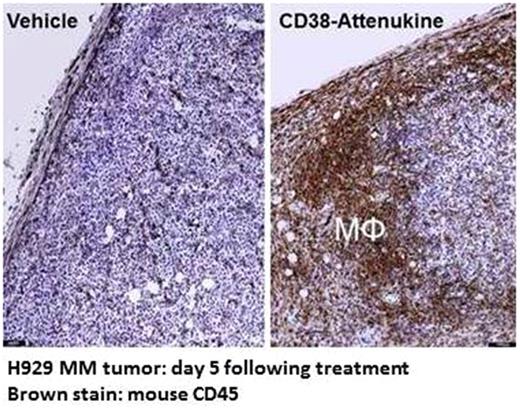Abstract
Despite recent advances in treatment, multiple myeloma (MM) remains an incurable disease. We previously reported that targeting an attenuated form of interferon-alpha (IFNα) directly to MM tumor cells via an anti-CD38 antibody induces robust and durable responses in murine xenograft MM models, eliminating large established human tumors in mice. We demonstrated that this attenuated immunocytokine, or Attenukine™, exhibits 10,000-fold increased specificity for CD38-positive cells in vitro compared to native IFNα and, importantly, is less toxic than native IFNα to normal bone marrow cells in vitro. Application of this therapy is predicted to significantly expand the therapeutic index of IFNα therapy beyond that of an immunocytokine, providing a rationale for clinical testing in MM.
In this study, we explored potential mechanisms mediating the robust anti-MM tumor activity of the CD38-Attenukine™. In MM xenograft models, immunohistochemistry analysis of ex vivo tumors taken from treated and untreated mice revealed rapid and robust infiltration of M1 (iNOS positive) macrophages in treated MM tumors (shown in figure). Targeted depletion of macrophages in tumor bearing mice prior to treatment demonstrated the importance of macrophages for the robust and durable activity. Follow-on experiments compared the anti-tumor activity of the CD38-Attenukine™ in different mouse strains with varied degrees of immune competence. While treatment of SCID mice bearing NCI-H929 tumors with 5 mg/kg CD38-Attenukine™ eliminated tumors in all mice, tumors in only 2 of 10 mice were eliminated in the NOD-SCID background, and no tumors were eliminated in the NSG mouse strain. The NOD-SCID and NSG strains, which have defective macrophage populations, showed significantly less macrophage infiltration than was observed in the SCID mouse strain. Both the macrophage infiltration and antitumor activity of the CD38-Attenukine™ could be fully restored in NOD-SCID mice when co-treated with an anti-human CD47 antibody. Blocking CD47 signaling is thought to correct the defect in the NOD-SCID macrophage compartment. Interestingly, tumor sections from CD38-Attenukine™ treated mice were caspase-3 negative, suggesting that apoptosis may not be the major mechanism of tumor cell death in these models. In fact, based on the requirement for a glycosylated IgG Fc for robust and durable response, we predict that antibody-dependent cellular phagocytosis (ADCP) is a major mechanism for the observed tumor regression. Additional findings suggest that IFNα-induced chemokine production from tumor cells may signal M1 macrophage infiltration and activation following treatment. In conclusion, the potent anti-tumor response observed in CD38-Attenukine™ treated mice is the result of at least two complementary mechanisms, direct anti-proliferative activity of IFNα on tumor cells and indirect recruitment and activation of tumoricidal macrophages potentially through a chemokine gradient. These findings provide a solid framework supporting clinical evaluation of a CD38-Attenukine™ immunotherapy in MM patients.
Pogue: Teva Pharmaceuticals: Employment. Bi: Teva Pharmaceuticals: Employment. Armanini: Teva Pharmaceuticals: Employment. Fatholahi: Teva Pharmaceuticals: Employment. Taura: Teva Pharmaceuticals: Employment. Valencia: Teva Pharmaceuticals: Employment. Yun: Teva Pharmaceuticals: Employment. Sho: Teva Pharmaceuticals: Employment. Jamin: Teva Pharmaceuticals: Employment. Nock: Teva Pharmaceuticals: Employment. Wilson: Teva Pharmaceuticals: Employment.
Author notes
Asterisk with author names denotes non-ASH members.


This feature is available to Subscribers Only
Sign In or Create an Account Close Modal